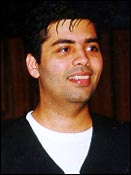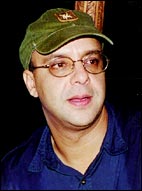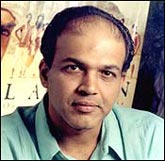 He is the man behind the lights, the camera and the action. He's the man who calls, 'Cut!'
He is the man behind the lights, the camera and the action. He's the man who calls, 'Cut!'
The moving picture is his life; the cast and crew his heartbeat; the story his lifeblood; the fate of the final product a life and death issue.
So it wouldn't be unfair to state that filmmaking is essentially a director's medium. He, after all, creates the shots.
But, with time, the stage of these shots change. Like life, cinema too evolved. The mute medium gained voice. Its black and white world earned colourful vibrancy. Its trembling sounds sang a digital tune.
Until recently, cinema alternated between grandeur and simplicity.
Either the film -- depending on the prestige level of its banner, the star value of its cast and the success ratio of its director -- was big, or it bragged of a humble albeit arrogant label of a 'sensible' film with its assets being an engaging storyline, uncompromising direction and actors (not 'stars').
![]()
More on rediff.com!
![]()
![]()
![]()
![]()
Ajay, Bipasha's Apaharan![]()
Why Aamir didn't like Devdas![]()
Pam Anderson fights AIDS!![]()
![]()
![]()
The audience had to make a choice between entertainment and realism. The market for the latter brand of filmmaking was comparatively small, but nevertheless progressed steadily like the proverbial hare. Only here, it was never a part of the race.
But, as emphasised earlier, times have changed. The span for both success and failure is short. Increased opportunities are accompanied with cutthroat competition. No one is invincible, everyone is replaceable. Unless there is room for constant renovation and the guts to enter unknown territories of filmmaking, a director has to make peace with resting on past laurels.
Even a formula filmmaker like David Dhawan realised dim-witted comedy and double-meaning innuendo would not further his career any more. In an interview to rediff.com prior to the release of Mujhse Shaadi Karogi, Dhawan said, "So far, I have targeted my films at the masses. But now I have started looking at what the audiences in the multiplexes want."
And the hip Salman Khan-Akshay Kumar-Priyanka Chopra comedy turned out to be what the public wanted.
Ditto for Abbas-Mastan. Known for their trademark suspense thrillers, the duo in white attempted a desi take on Disclosure. And going by Aitraaz's hit status, they carried it off rather well.
Then there is Ram Gopal Varma, who, irrespective of hits or flops, keeps making his kind of films at a fanatic pace. Their becoming a hit is mostly incidental, rarely intentional. And it cannot be denied: the underworld is his forte. He never fails in that genre. But the Godfather fan is also busy building a mini gang of fresh talent to get behind the camera. His discoveries -- Shimit Amin, Sriram Raghavan, Prawaal Raman, Chandan Arora -- have given us enough reason to believe that they have what it takes.
 In the race of running directors, Yash Chopra, Subhash Ghai, Varma, Rajkumar Santoshi, Vidhu Vinod Chopra, Mansoor Khan, Sooraj R Barjatya and Rakesh Roshan have already earned a place in the hall of fame.
In the race of running directors, Yash Chopra, Subhash Ghai, Varma, Rajkumar Santoshi, Vidhu Vinod Chopra, Mansoor Khan, Sooraj R Barjatya and Rakesh Roshan have already earned a place in the hall of fame.
Earlier competition, though ever so pressurising, wasn't so extraordinary. Thanks to all the exposure around us in the form of the Internet, cable television, and various media, viewers are considerably literate with cinema. The audience, though foolish in deciding the destiny of films at times, is much more discerning now. This massive extent of availability and accessibility has led to greater demand. The viewer wants every paisa of his ticket to be justified. He wants quality, stars, content, entertainment, education -- and, if possible, free popcorn too!
A perceptive filmmaker will understand his audience's needs and strive to deliver. Even the most passionate director prefers a cocky audience to an empty hall. That's when packaging comes in. A film is now a product, which needs to be cleverly marketed. The audience doesn't like to be taken for granted. If it's publicised as horror, it better spook! Many a film has been a victim of misguided publicity, a la Fida or Naach. On the other hand, some films survive merely owing to sensational or relentless promotion, like Murder, Julie or Raaz.
Clearly, being a filmmaker is tough. The era of showmen is over. It's all about making a film that clicks. Irrespective of a banner's stature, a director is judged on the basis of his instant credibility.
The question is: which filmmakers in the current scenario will be able to beat the heat and hang around long enough to pick up a lifetime trophy?
 Immediate names that come to mind are Sanjay Leela Bhansali, Ashutosh Gowariker and Karan Johar. Bhansali's films are dramatic -- be it the imagery or the emotion -- while their actual quality remains dubious. Gowariker, post-Lagaan, is the best thing to have happened to Hindi films. With Swades, he proved he can be simple at will, but perhaps stretched his point too far.
Immediate names that come to mind are Sanjay Leela Bhansali, Ashutosh Gowariker and Karan Johar. Bhansali's films are dramatic -- be it the imagery or the emotion -- while their actual quality remains dubious. Gowariker, post-Lagaan, is the best thing to have happened to Hindi films. With Swades, he proved he can be simple at will, but perhaps stretched his point too far.
Karan Johar's films have everything -- emotion, tradition, colour and glamour. But what sets him apart are his tongue-in-cheek scripts.
Ditto for Aditya Chopra. If only he would give us another Dilwale Dulhania Le Jayenge.
Then there is Farhan Akhtar. His films reflect the 'now' guy. You identify with his characters and relate to their situation in different ways. If the 'guy' in his films grows, there is a lot to look forward to.
If you thought female directors are all about women-oriented subjects, think again. Farah Khan is as original as they get. Her Main Hoon Na reflected the 1970s movie mania that surrounded everyone, including herself -- who grew up loving Amitabh Bachchan flicks.
Shaad Ali (Saathiya), Rajkumar Hirani (Munnabhai MBBS), John Mathew Mathan (Sarfarosh), and Rakesh Mehra (Aks) are strong contenders too. In their first ventures, they left lasting impacts. A lot is expected from these talented men. But the competition is tough and the audience is greedy for more.





